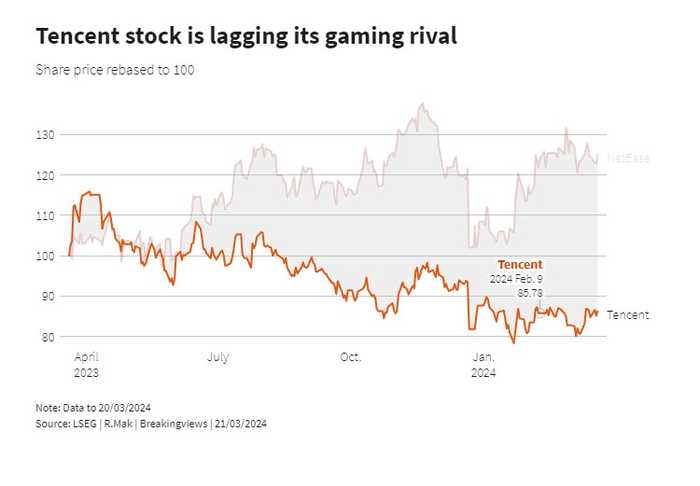Published 19:18 IST, March 21st 2024
Tencent is running out of excuses for gaming woes
The $350 billion Shenzhen-based company founded by Pony Ma admits it needs to get the house in order.
- Republic Business
- 4 min read

Game on. Tencent is being outplayed. Revenue is shrinking in its core video gaming business in China and overseas. The $350 billion Shenzhen-based company founded by Pony Ma admits it needs to get its "own house in order". That looks increasingly urgent.
The lucrative division remains the company's crown jewel, accounting for over a quarter of its top line. Yet Beijing's years-long regulatory assault on the sector, including imposing curbs on how much time and money minors can spend online, has taken its toll.
Tencent has suffered from weak growth before. Total group revenue contracted for the first time in 2022 by a small amount. The company then returned to growth, thanks to advertising, fintech and other units. But the disappointing fourth quarter it reported on Wednesday in its domestic and international gaming division is troubling.
At home, where Beijing's crackdowns have eased, Tencent President Martin Lau partly blamed the slowdown on zealous gamers spending their money on titles in the first quarter last year, according to Reuters. On a separate call with analysts, he elaborated that "monetisation has temporarily stagnated" at the company's two biggest titles "Honour of Kings" and "Peacekeeper Elite". The company's 3% year-on-year fall in gaming revenue within the People's Republic, to 27 billion yuan ($3.75 billion), is a far cry from smaller rival NetEase, which reported a 29% jump in mobile games sales over the same period.
Tencent's global expansion has also hit a speed bump, with revenue falling 1% excluding currency fluctuations. Back in 2022, the company blamed "a post pandemic digestion period"; this time, it cryptically said its Supercell subsidiary, which Tencent bought eight years ago in a $8.6 billion deal, was "repositioning" its games.
The company pledged to "at least double the size" of share buybacks this year to $12.8 billion. It also committed to overhauling leadership for some games and focusing on big-budget titles.
Shares of Tencent were up as much as 3% on Thursday. Still, the Hong Kong stock is down over 10% in the past year. It is underperforming NetEase's U.S.-shares that have surged by a quarter and trade on 14 times forecast next 12 months earnings, per LSEG data, slightly above Tencent. The company needs new hits, and fast.
Tencent is being outplayed. Revenue is shrinking in its core video gaming business in China and overseas. The $350 billion Shenzhen-based company founded by Pony Ma admits it needs to get its "own house in order". That looks increasingly urgent.
The lucrative division remains the company's crown jewel, accounting for over a quarter of its top line. Yet Beijing's years-long regulatory assault on the sector, including imposing curbs on how much time and money minors can spend online, has taken its toll.
Tencent has suffered from weak growth before. Total group revenue contracted for the first time in 2022 by a small amount. The company then returned to growth, thanks to advertising, fintech and other units. But the disappointing fourth quarter it reported on Wednesday in its domestic and international gaming division is troubling.
At home, where Beijing's crackdowns have eased, Tencent President Martin Lau partly blamed the slowdown on zealous gamers spending their money on titles in the first quarter last year, according to Reuters. On a separate call with analysts, he elaborated that "monetisation has temporarily stagnated" at the company's two biggest titles "Honour of Kings" and "Peacekeeper Elite". The company's 3% year-on-year fall in gaming revenue within the People's Republic, to 27 billion yuan ($3.75 billion), is a far cry from smaller rival NetEase, which reported a 29% jump in mobile games sales over the same period.
Tencent's global expansion has also hit a speed bump, with revenue falling 1% excluding currency fluctuations. Back in 2022, the company blamed "a post pandemic digestion period"; this time, it cryptically said its Supercell subsidiary, which Tencent bought eight years ago in a $8.6 billion deal, was "repositioning" its games.
The company pledged to "at least double the size" of share buybacks this year to $12.8 billion. It also committed to overhauling leadership for some games and focusing on big-budget titles.
Shares of Tencent were up as much as 3% on Thursday. Still, the Hong Kong stock is down over 10% in the past year. It is underperforming NetEase's U.S.-shares that have surged by a quarter and trade on 14 times forecast next 12 months earnings, per LSEG data, slightly above Tencent. The company needs new hits, and fast.

Updated 19:18 IST, March 21st 2024